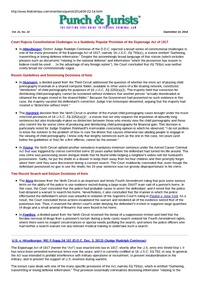In this case, a divided panel from the Third Circuit disagreed about whether “the mere act of placing child pornography materials in a shared computer folder, available to other users of a file sharing network, constitutes distribution of child pornography” for purposes of 18 U.S.C. § 2252(a)(2).
In this …
Lawson Hardrick was found guilty after a jury trial of two counts of knowingly receiving visual depictions of minors engaged in sexually explicit conduct in violation of 18 U.S.C. § 2252(a)(2); and he was sentenced to 120 months, a below-Guidelines sentence.
On appeal, Hardrick argued that the district court …
In this case, the defendant, Mark Tyrell Fowlkes, appealed his conviction for drug distribution and possession with intent to distribute, arguing principally that the forcible removal of drugs from his rectum by officers without medical training or a warrant violated his Fourth Amendment rights. In September, 2006, after he …
The Espionage Act of 1917 (herein the "Act") was enacted into law in 1917, shortly after the U.S. entry into World War I. It has since been amended numerous times over the years; and it is currently codified at 18 U.S.C. § 792, et seq. In general, the Act …
This is an important Fourth Amendment decision, particularly in the modern-day era of heavily-armed SWAT team raids that seem to have become the norm. As the Court explained:
“The issue raised by this appeal is whether the police violated Johnny Nora's Fourth Amendment rights when they searched his home. …
